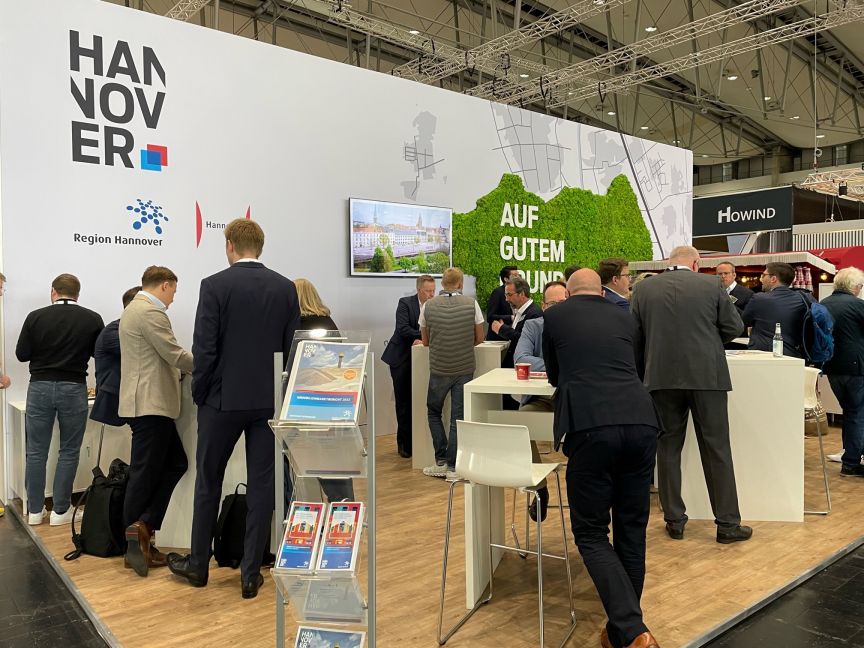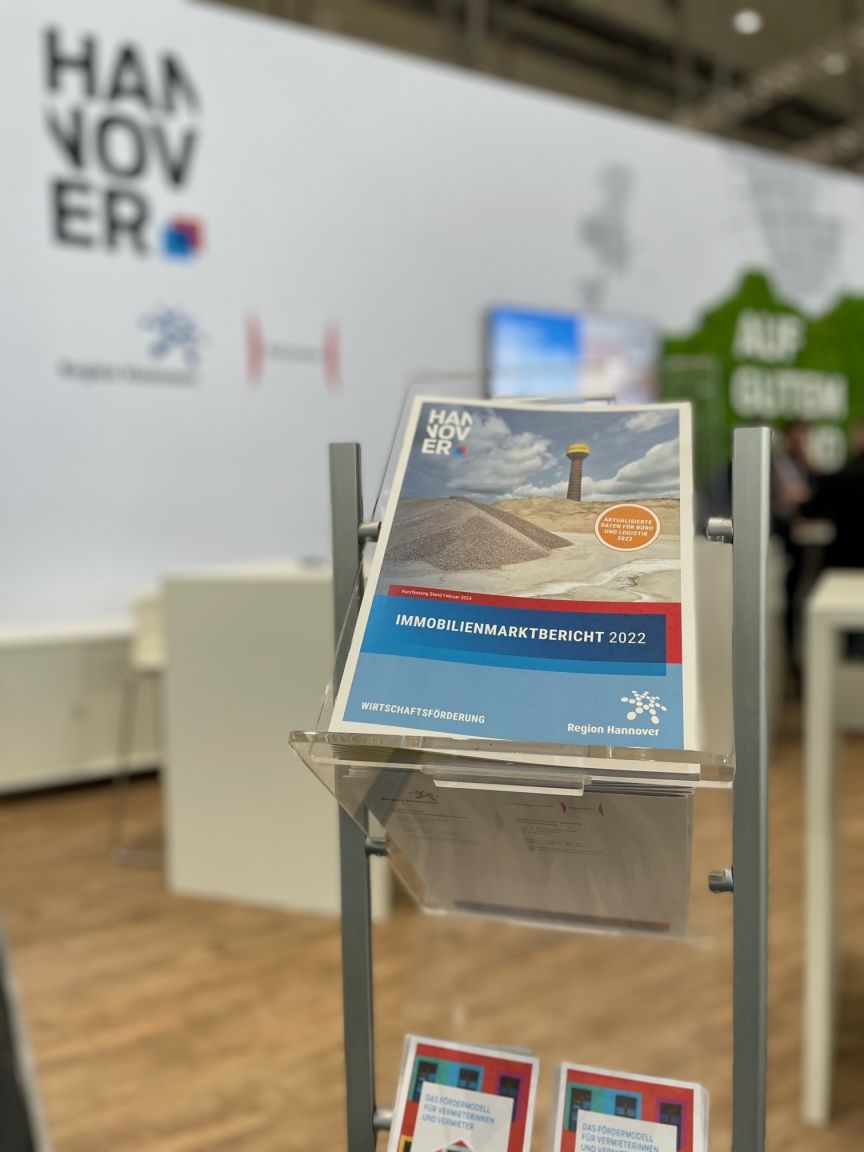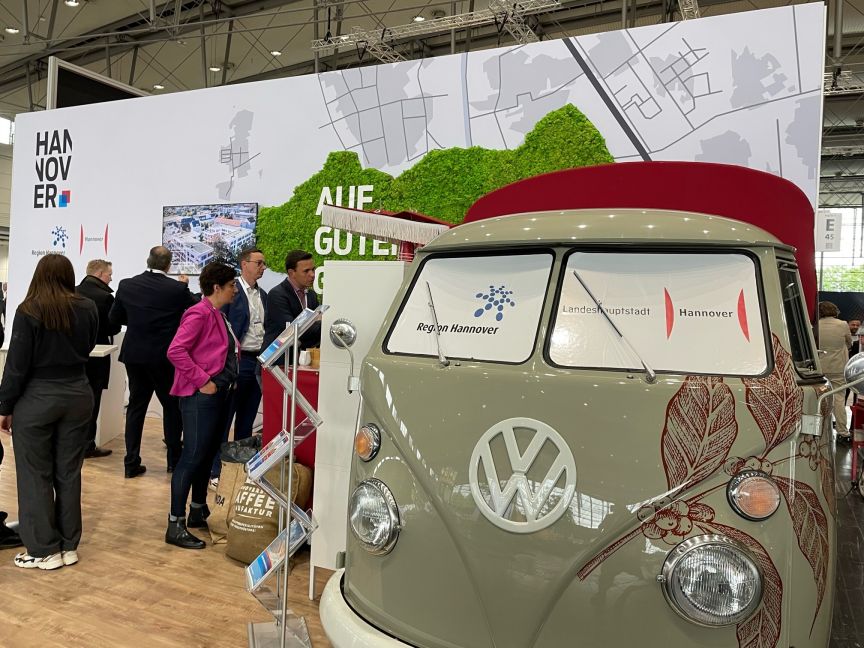Real estate fair: Region and state capital together at Real Estate Arena

Under the motto "On good ground", the topics of science and business , the residential real estate market and housing promotion as well as commercial space development are the focus of the joint appearance of the region and the state capital of Hanover (LHH) at the two-day Real Estate Arena trade fair , which started today (Wednesday, May 24). Experts from both administrations will be holding technical discussions with visitors at the 50 square meter joint stand. In addition to climate protection, which is an important topic for both the Hannover Region and the state capital, the changes in city centers play a major role.
The Real Estate Arena is still a new national trade fair format for the real estate industry and runs until tomorrow, Thursday (May 25), and is being held in Hanover for the second time. It focuses on the medium-sized real estate industry and cities with between 250,000 and 600,000 inhabitants with regional to national significance. As the organizer, Deutsche Messe AG is expecting around 275 exhibiting companies and around 5,000 visitors, which is significantly more than last year. The motto of the event is "bold, controversial and up close" . Parallel to the discussions at the exhibition stands, there will be an extensive program of talks and discussions on two stages. The Real Estate Arena was opened by Olaf Lies, Lower Saxony's Minister for Economic Affairs, Transport, Building and Digitalization, Hanover's Lord Mayor Belit Onay and Dr. Jochen Köckler, CEO of Deutsche Messe AG. The eight key themes of the trade fair are digitalization, urban development, sustainability, logistics/mobility, housing, retail, tourism/hotel and skilled workers.
Regional President Steffen Krach , together with Ulf-Birger Franz, Head of Economic Affairs for the Hannover Region , and the mayors of the surrounding municipalities , will be visiting the trade fair on Thursday. The focus of the visit will include start-ups at the joint stand of the Hanover-based residential construction company meravis, the metropolitan region, the Chamber of Architects, the twin city of Leipzig and other stands of regional companies.

One of the focal points of the joint stand is "Business and Science": In recent years, attractive space, real estate and infrastructure offers for innovative and knowledge-based companies have been developed in the immediate vicinity of university campuses in Hannover. The city and region are experiencing a sustained and in some cases growing demand for technology properties that can be used by research institutes, university spin-offs, technology-oriented start-ups and companies. Two locations in particular show how much potential there is for business and science in the north-west of Hanover and how it radiates into the entire region. Firstly, around four hectares of expansion space is available for a technology park at the Mechanical Engineering Campus in Garbsen. The search for investors will continue until the end of the year. From 2024, the first buildings are to be constructed in a new knowledge quarter in cooperation with the city of Garbsen.
The other area with potential, SCIENCE AREA 30X (formerly "Wissenschafts- und Technologiepark Hannover"), is just a stone's throw away in Hanover's Marienwerder district. The location for future-oriented research and development solutions in business and science has already grown dynamically in recent years. With its combination of research institutes, training centers, young and established companies as well as flexible space offers in three differently oriented technoparks and technology centers, SCIENCE AREA 30X is a decisive building block in the regional innovation ecosystem. Most recently, at the beginning of May, the business development agency hannoverimpuls expanded its technology center with the TECH2 building.
The requirements for sustainable land use are increasing. Both municipalities and companies are faced with the challenge of offering or finding commercial and industrial sites that are suitable for the market. Whether pre-used ("brownfield") or newly designated ("greenfield") areas - land consumption must become more efficient in order to achieve the sustainability goals that have been set. The issue is not only of concern to stakeholders in and around Hannover. Companies and municipalities throughout Germany are looking for solutions.
Even before the trade fair opened yesterday (Tuesday, May 23), more than 200 registered participants from all over Germany took part in discussions at the specialist congress "Bottleneck commercial space - demand, existing stock and concepts in the focus of municipalities and companies" , which preceded the Real Estate Arena. In addition to numerous experts from public administration, business development and the real estate industry, the Hanover-based companies Troester, Intech Worldwide and Continental were also represented at the event, which was organized by the Hanover region and state capital together with bulwiengesa AG and Deutsche Messe AG in connection with "Land policy from an industrial perspective". This topic also dominated the discussions at the joint stand on the first day of the trade fair.

With the WohnBauInitiative (WoBI), the Hannover Region supports the cities and municipalities in providing housing and promotes more and denser housing construction, particularly in the multi-family house market segment. To this end, the initiative uses various instruments to support the municipalities in the region. Among other things, local politicians are made aware of the issue of multi-family housing construction and higher densities, and planning authorities and the local real estate industry discuss the future of modern housing construction together in networks.
As part of the housing initiative, the Hannover Region's housing subsidies will be the main topic at the stand. The aim is to use its funding instruments to create sufficient affordable housing for all residents of the region. While the subsidy-based promotion of new construction is currently struggling due to the major challenges in housing construction, the promotion of occupancy rights in existing housing is developing into a successful model: with an annual budget of three million euros in the regional budget, almost 200 apartments have been acquired in just under three years. The demand for this support is constantly increasing. So far, it has primarily been used by private landlords, but it is also aimed at housing companies and larger owners of existing housing.
